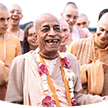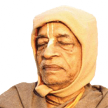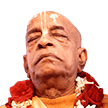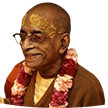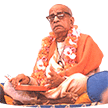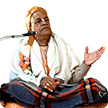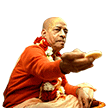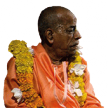Krishna's Body - an essential subject: Difference between revisions
Visnu Murti (talk | contribs) (Created page with "Category:Essential Subjects <!----------------------- edit below this line -----------------------> <!------------------------ begin introduction text --------------------...") |
(Vanibot #0041: Moves Choose Another box to the end) |
||
| Line 2: | Line 2: | ||
<!----------------------- edit below this line -----------------------> | <!----------------------- edit below this line -----------------------> | ||
<!------------------------ begin introduction text ------------------------> | <!------------------------ begin introduction text ------------------------> | ||
One gopī addressed her friend and began to praise the bodily features of Kṛṣṇa. She praised His blackish complexion, the reddish color of chewing pan enhancing His beauty hundreds of times, the curling hair on His head, the kuṅkuma red spots on His body and the tilaka on His forehead. The supreme abode of Kṛṣṇa is always throwing off the effulgence known as brahma-jyotir, and that effulgence is emanating from His body. The luster of the hosts of jewels fixed on the chest of the Lord can defeat even the luster of the sun, and still, when compared with the bodily luster of the Lord, that crest of jewels appears to be only as bright as one of the stars in the sky. Therefore the transcendental influence of Kṛṣṇa is so great that it can defeat anyone. | |||
Srila Prabhupada's books, lectures, conversations and letters offer a comprehensive presentation of this essential subject as seen in the Vaniquotes '''[[Vaniquotes:Category:Body | A person is called mild when he cannot even bear the touch of the most soft thing. It is described that every part of Kṛṣṇa's body is so soft that even at the touch of newly grown leaves, the color of the touched part of His skin would change. At His kaiśora age, Kṛṣṇa's endeavors were always bent toward arranging the rāsa dance, as well as toward killing the demons in the forest of Vṛndāvana. | ||
Srila Prabhupada's books, lectures, conversations and letters offer a comprehensive presentation of this essential subject as seen in the Vaniquotes '''[[Vaniquotes:Category:Krsna's Body|Krishna's Body]]''' category. An introduction from his books is given below in the following 8 quotes. | |||
<!-------- end introduction text and don't touch next three lines ---------> | <!-------- end introduction text and don't touch next three lines ---------> | ||
---- | ---- | ||
== Quotes from Srila Prabhupada's books == | == Quotes from Srila Prabhupada's books == | ||
| Line 13: | Line 15: | ||
{{VaniQuotebox|A Mayavadi is one who considers the body of the Supreme Personality of Godhead Krsna to be made of maya and who also considers the abode of the Lord and the process of approaching Him, devotional service, to be maya|Śrīla Bhaktisiddhānta Sarasvatī Ṭhākura has explained the term "Māyāvādī" as follows: "The Supreme Personality of Godhead is transcendental to the material conception of life. A Māyāvādī is one who considers the body of the Supreme Personality of Godhead Kṛṣṇa to be made of māyā and who also considers the abode of the Lord and the process of approaching Him, devotional service, to be māyā. The Māyāvādī considers all the paraphernalia of devotional service to be māyā." '''(Caitanya-caritāmṛta, Ādi-līlā 7.33)'''}} | {{VaniQuotebox|A Mayavadi is one who considers the body of the Supreme Personality of Godhead Krsna to be made of maya and who also considers the abode of the Lord and the process of approaching Him, devotional service, to be maya|Śrīla Bhaktisiddhānta Sarasvatī Ṭhākura has explained the term "Māyāvādī" as follows: "The Supreme Personality of Godhead is transcendental to the material conception of life. A Māyāvādī is one who considers the body of the Supreme Personality of Godhead Kṛṣṇa to be made of māyā and who also considers the abode of the Lord and the process of approaching Him, devotional service, to be māyā. The Māyāvādī considers all the paraphernalia of devotional service to be māyā." '''(Caitanya-caritāmṛta, Ādi-līlā 7.33)'''}} | ||
{{VaniQuotebox| | {{VaniQuotebox|Krsna appears in this material world in His original eternal form, with two hands, holding a flute. He appears exactly in His eternal body, uncontaminated by this material world|The conditioned soul may have one kind of body in the present birth, but he has a different body in the next birth. In the material world, the living entity has no fixed body but transmigrates from one body to another. The Lord, however, does not do so. Whenever He appears, He does so in the same original body, by His internal potency. In other words, Kṛṣṇa appears in this material world in His original eternal form, with two hands, holding a flute. He appears exactly in His eternal body, uncontaminated by this material world. '''(Bhagavad-gītā 4.6)'''}} | ||
{{VaniQuotebox| | {{VaniQuotebox|The name Madana refers to Cupid, but Krsna is the spiritual Madana. His body is not material like the body of Cupid in this material universe. Krsna's body is all-spiritual - sac-cid-ananda-vigraha|The spirit soul remains even after the annihilation of the material body. That spiritual world is called the aprākṛta (anti-material) world. In this transcendental, spiritual world or universe, the highest planetary system is known as Goloka Vṛndāvana. That is the abode of Lord Kṛṣṇa Himself, who is also all-spiritual. Kṛṣṇa is known there as Aprākṛta-madana. The name Madana refers to Cupid, but Kṛṣṇa is the spiritual Madana. His body is not material like the body of Cupid in this material universe. Kṛṣṇa's body is all-spiritual—sac-cid-ānanda-vigraha (Bs. 5.1). Therefore He is called Aprākṛta-madana. He is also known as Manmatha-madana, which means that He is attractive even to Cupid. '''(Caitanya-caritāmṛta, Madhya-līlā 8.139)'''}} | ||
{{VaniQuotebox| | {{VaniQuotebox|It was not very difficult for Krsna to perform a miracle by extending His bodily feature, but He had no desire to do it because of His deep filial love for His mother, Yasoda|Lord Kṛṣṇa did not need to expand Himself to the length of the she-demon Pūtanā, although He was quite competent to extend Himself more than six miles long. when He took possession of His land, promised by Bali Mahārāja, He expanded His footstep to the top of the universe, extending over thousands and millions of miles. So it was not very difficult for Kṛṣṇa to perform a miracle by extending His bodily feature, but He had no desire to do it because of His deep filial love for His mother, Yaśodā. '''(Śrīmad-Bhāgavatam 2.7.27)'''}} | ||
{{VaniQuotebox| | {{VaniQuotebox|Baladeva, Sankarsana and other expansions of Krsna are emanations of Maha-Sankarsana. All the incarnations and expansions exist simultaneously in the body of Krsna, who is described as two-handed| Baladeva, Saṅkarṣaṇa and other expansions of Kṛṣṇa are emanations of Mahā-Saṅkarṣaṇa. All the incarnations and expansions exist simultaneously in the body of Kṛṣṇa, who is described as two-handed. There are also descriptions of the Goloka planet, Vṛndāvana (the eternal place of Kṛṣṇa), the identity of Goloka and Vṛndāvana, the Yādavas and the cowherd boys (both eternal associates of Kṛṣṇa), the equality of the manifest and unmanifest pastimes, Śrī Kṛṣṇa's manifestation in Gokula, the queens of Dvārakā as expansions of the internal potency, and, superior to them, the superexcellent gopīs. '''(Caitanya-caritāmṛta, Madhya-līlā 1.43)'''}} | ||
{{VaniQuotebox| | {{VaniQuotebox|The bodily beauty of Sri Krsna is like a wave in the ocean of eternal youth. In that great ocean is the whirlpool of the awakening of ecstatic love|The bodily beauty of Śrī Kṛṣṇa is like a wave in the ocean of eternal youth. In that great ocean is the whirlpool of the awakening of ecstatic love. The vibration of Kṛṣṇa's flute is like a whirlwind, and the flickering minds of the gopīs are like straws and dry leaves. After they fall down in the whirlwind, they never rise again but remain eternally at the lotus feet of Kṛṣṇa. '''(Caitanya-caritāmṛta, Madhya-līlā 21.113)'''}} | ||
{{VaniQuotebox| | {{VaniQuotebox|No one should conclude that Your (Krsna's) body is like an ordinary material body. Your body is aksara, indestructible. The material body is always full of threefold miseries, but Your body is sac-cid-ananda-vigraha|In the Bhagavad-gītā also it is stated that You are the source of the Brahman effulgence. No one should conclude that Your body is like an ordinary material body. Your body is akṣara, indestructible. The material body is always full of threefold miseries, but Your body is sac-cid-ānanda-vigraha: (Bs. 5.1) full of bliss, knowledge and eternality. You are also nirañjana because Your pastimes, as the little son of Mother Yaśodā or the lover of the gopīs, are never contaminated by the material qualities. '''(Kṛṣṇa Book, Chapter 14)'''}} | ||
{{VaniQuotebox| | {{VaniQuotebox|The transcendental body of Krsna resembles the lotus flower|"The Supreme Personality of Godhead, in His pleasing dress, appeared at the scene of the sacrificial arena when King Yudhiṣṭhira was performing the Rājasūya sacrifice. All important personalities from different parts of the universe had been invited to the sacrificial arena, and all of them, upon beholding Kṛṣṇa there, considered that the Creator had ended all of His craftsmanship in the creation of this particular body of Kṛṣṇa."It is said that the transcendental body of Kṛṣṇa resembles the lotus flower in eight parts—namely His face, His two eyes, His two hands, His navel and His two feet. '''(Nectar of Devotion, Chapter 21)'''}} | ||
<!----------------- edit quote boxes above this line -----------------> | <!----------------- edit quote boxes above this line -----------------> | ||
'''Krishna's Body - [[Vaniquotes:Category:Body | '''Krishna's Body - [[Vaniquotes:Category:Krsna's Body|explore more within this category]]'''. | ||
{{EsentialSubjectTotal}} | {{EsentialSubjectTotal}} | ||
<div style="float:left;"> | |||
{{EssentialSubjectnav}} | |||
</div> | |||
__NOTOC__ | __NOTOC__ | ||
__NOEDITSECTION__ | __NOEDITSECTION__ | ||
Latest revision as of 16:42, 22 November 2020
One gopī addressed her friend and began to praise the bodily features of Kṛṣṇa. She praised His blackish complexion, the reddish color of chewing pan enhancing His beauty hundreds of times, the curling hair on His head, the kuṅkuma red spots on His body and the tilaka on His forehead. The supreme abode of Kṛṣṇa is always throwing off the effulgence known as brahma-jyotir, and that effulgence is emanating from His body. The luster of the hosts of jewels fixed on the chest of the Lord can defeat even the luster of the sun, and still, when compared with the bodily luster of the Lord, that crest of jewels appears to be only as bright as one of the stars in the sky. Therefore the transcendental influence of Kṛṣṇa is so great that it can defeat anyone.
A person is called mild when he cannot even bear the touch of the most soft thing. It is described that every part of Kṛṣṇa's body is so soft that even at the touch of newly grown leaves, the color of the touched part of His skin would change. At His kaiśora age, Kṛṣṇa's endeavors were always bent toward arranging the rāsa dance, as well as toward killing the demons in the forest of Vṛndāvana.
Srila Prabhupada's books, lectures, conversations and letters offer a comprehensive presentation of this essential subject as seen in the Vaniquotes Krishna's Body category. An introduction from his books is given below in the following 8 quotes.
Quotes from Srila Prabhupada's books
Krishna's Body - explore more within this category.
Vanipedia has now over 903 introductory articles compiled from Srila Prabhupada's books under the series titled Essential Subjects. All these articles can be seen in the Table of Content on the right side of this article and also here in this Umbrella Category. Browse through them to relish the breadth and depth of Srila Prabhupada's teachings - There is a subject for everyone.
